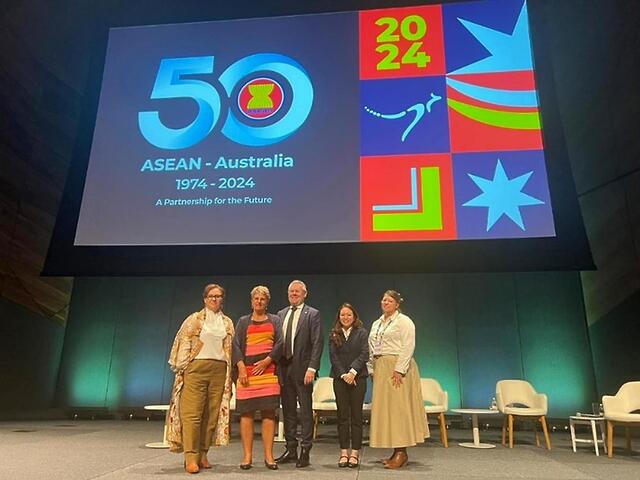
Agri-food sector on show at ASEAN-Australia Special Summit
The ASEAN-Australia Special Summit was held in Melbourne last week to celebrate 50 years of Australian engagement with the Association of Southeast Asian Nations (ASEAN).
After 50 years of dialogue, agriculture is more important to the relationship than ever before. The Special Summit built further on our relationships, cooperation, and trade opportunities—something vital for Australian agricultural trade as ASEAN grows.
We know that by 2040 Southeast Asia will be an economic powerhouse that is projected to be the world’s fourth-largest economy as a bloc after the United States, China, and India. ASEAN—with a consumer market 10 times larger than Australia’s.
Australia’s agricultural exports to the ASEAN region have nearly doubled over the past 5 years, reaching $17.2 billion in 2023. Australia also sources a fifth of its agricultural imports from the region, highlighting the significance of the relationship and growing opportunities for two-way trade and investment between Australia and the ASEAN region.
Currently About 23 per cent of Australia’s agricultural exports go to Southeast Asia, and there is huge potential for further growth in that market. Leaders and ministers from 10 countries across Southeast Asia attended the Special Summit alongside Australian and Southeast Asian CEOs. Together, they shared their vision for growth in our region.
Minister for Agriculture, Fisheries and Forestry Murray Watt spoke of how highly Australia values our relationship with ASEAN, and that Australia is serious about increasing agricultural trade to Southeast Asia to benefit Australian producers and provide food security to our near neighbours and region.
Minister Watt led the food futures and agri-tech panel discussion with four Small to Medium Enterprise CEOs (SMEs) and held productive discussions at the Agriculture and Food Supply Chains CEO roundtable.
There was wide ranging discussion from demonstrating our agricultural stainability credentials to the importance of First Nations involvement in agriculture and promoting Indigenous Australian produce to the ASEAN market. There was also a focus on opportunities for collaboration to protect our food systems by managing biosecurity threats to our region together.
The diverse range of ASEAN markets was promoted as a positive for our exporters, as it provides options for different products, classes of produce, and when conditions in one market experience a down-turn producers and exporters can turn to supply another. This was highlighted for Australian citrus meets demand in the ASEAN market for a wide range of sizes and variety of fruit.
The future for Australia and ASEAN’s relationship is bright. Our involvement with the Special Summit stretched beyond collaborating on the trading of goods and services and encouraged the trade of ideas and solutions to our collective challenges.
The visit from our ASEAN friends also allowed for a visit to Ellinbank Smart Farm in Victoria’s Gippsland to demonstrate Australian agriculture’s innovation and sustainability credentials first hand. Minister Watt hosted a delegation from Vietnam, including his counterpart, Minister Hoan; Southeast Asian agri-food CEOs; and Australian Research and Development Corporations (RDC) CEOs. The smart farm is one of Australia’s leading dairy research and innovation facilities and aims to be the first carbon-neutral, pasture-based dairy farm by 2026.
Overall, the ASEAN-Australia Special Summit strengthened relationships between government and industry across the region by bringing together eminent speakers to discuss opportunities and challenges of expanding into the ASEAN region.
Videos
Minister for Agriculture, Fisheries and Forestry Murray Watt represented Australian agriculture at the ASEAN Special Summit.
Minister Watt:
Obviously, ASEAN is a really important trading partner of Australia in the Agriculture space. ASEAN nations are our second biggest trading partner with exports comparable to those that we export to China. I think a lot of people don’t appreciate the importance and size of that market for our agricultural production, but equally we obviously import a lot of products from ASEAN nations as well. So its really important I think to recognise this is a genuine two way relationship, and even just talking to the DAFF personnel there have been Australian businesses coming up looking for opportunities to export to ASEAN nations and equally ASEAN nations seeking a better understanding of what they would need to do to export to us. So, I am sure some great connections will be made and we will celebrate that anniversary at the same time.
Susan Jenkin of Ironbark Citrus spoke of the opportunities for Australian fruit growers in exporting to ASEAN countries and their ability to help in the development of industries within those countries.
Susan Jenkin:
My company Ironbark Citrus is a producer, packer and exporter of fresh Australian Mandarins. We export a large proportion of our product into the various ASEAN countries and it is an enormously important market for us. I think there is huge potential with the population growth and development that is happening in the ASEAN region. Oh it’s very important that we come together, its important to share ideas, to share problems, and that way the more voices that are in the better the solution. There is probably two dreams to that, one is that we can continue to trade and trade easily into the region and the other dream would be to see the development of horticulture within the ASEAN region. I think Australian farmers have a lot to offer into ASEAN in terms of assiting ASEAN industries to develop their own horticulture, because trade is not all about us getting things into ASEAN it is also about ASEAN people developing their own horticulture. A lot of ASEAN countries are counter seasonal to us so there is a huge opportunity out there get into ASEAN countries and actually assist in the development of industries like the citrus industry.
Josie Angus of Signature Beef speaks about the importance of the ASEAN market to our beef producers.
Josie Angus:
We have talked for many years about the growth in ASEAN markets but the other opportunities that we see coming are particularly around e-commerce. [small cut] We are at the stage now where we can process a box of beef and have it in Melbourne in a couple of days direct from our farm to someone’s front door. The ability to then take that forward in an export scenario with something like beef is a bit unheard of but it is something that we are actively investigating and working out how we can actually make that happen. For our industry meetings like this are really important, both to meet with market experts to build those connections in market, but also to make sure that we can keep driving the messages about particularly what Small and Medium Enterprises on a day like today really need to facilitate that trade.
Sharon Windsor of Indigiearth speaks about the growing interest in Australian Indigenous produce within ASEAN and the enormous opportunities to expand into the ASEAN market.
Sharon Windsor:
I think the potential into the ASEAN market, the growth is incredible and there is a lot of interest in native ingredients and its important for us as First Nations people to actually be the authors of our own future so coming directly to us for knowledge, for our ingredients for that holistic approach to connecting with Australian native ingredients. Indigiearth, we produce a big range of Australian native ingredients/products, food, beverages, skin care, home fragrance. And we are a hospitality company, I’m a chef, and we deliver all sorts of functions but more importantly for me what I get out of it is sharing culture through food, and bringing together people from around the world with our food.
Dr Vanessa Teo of Agrome IQ speaks of how desirable Australian agricultural produce is to the ASEAN market and how she as an investor from the region is importing Australian produce.
Vanessa Teo:
There is high potential of Australian products entering the market in ASEAN, because that’s currently what I am working on. In Brunei today I also import produce from Australia to different distribution markets and at the same time we are opening a supermarket in Singapore called Modern Provisions which is focused on farmer first and developing famer’s stories that are working in sustainable practices. We have been travelling the world speaking to different famers and we see Australia as one of the biggest markets for our Singaporean customers and beyond. We have always seen Australia as a high value market, and they have such a strong global brand that something from Australia is seen as high quality, full of traceability, and at the end of the day we believe that farmers are following sustainable practices or moving to transition to them. And we as a market in South East Asia are looking for those and consumers want to know a lot more about their farm products and how they are growing them and we believe the market here is ready and we are excited to start moving more towards that.


